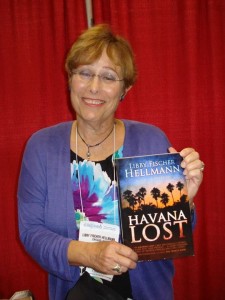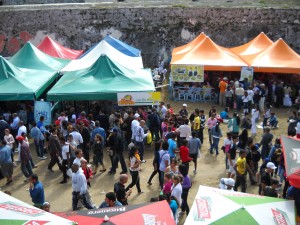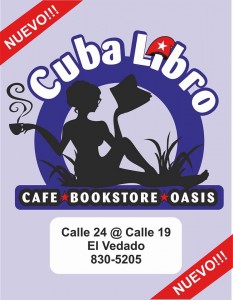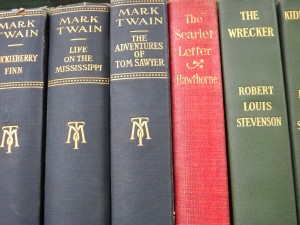 Cuba’s book selling world is almost wholly state-controlled. And politics sells the best, no surprise when the government controls the books available. Take 100 Hours with Fidel, an incredibly lengthy interview with Fidel Castro. Or Che Guevara’s Bolivian diary, another big seller. If you live in Cuba and want to broaden your reading, you face significant challenges.
Cuba’s book selling world is almost wholly state-controlled. And politics sells the best, no surprise when the government controls the books available. Take 100 Hours with Fidel, an incredibly lengthy interview with Fidel Castro. Or Che Guevara’s Bolivian diary, another big seller. If you live in Cuba and want to broaden your reading, you face significant challenges.
Despite a few signs of change, there are very few independent bookstores. Literature is curated and published by the government, which means it toes the political line. Exiled Cuban writers’ work isn’t available. And books by popular Latin American writers like Mario Vargas Llosa are more or less impossible to find. Why is the Cuban government so frightened of books? Because they might jeopardize the Revolution, a sure sign they are not confident in their ability to keep their people under control. But the US embargo doesn’t help either, hindering Cuban publishers’ ability to sell books abroad. So money, as well as politics, plays a part.
Cuba’s literary underground
 A few brave members of the country’s literary underground are creating private libraries. And the ebook revolution means it’s possible to share electronic copies of books—discreetly, of course. Some readers receive books from other parts of the world. And tourists bring them in, too.
A few brave members of the country’s literary underground are creating private libraries. And the ebook revolution means it’s possible to share electronic copies of books—discreetly, of course. Some readers receive books from other parts of the world. And tourists bring them in, too.
However, if they’re considered “inappropriate,” (Either politically, socially or human rights-wise) the government still confiscates them. When they find them. Back in 2003 the Cuban government cracked down and jailed 75 of the most rebellious owners of private libraries and readers. But while the government still wants to prevent its people reading what it sees as seditious literature, foreigners keep bringing books in.
Contemporary writing survives against the odds
 Having said all that, Cuba does have some well-known contemporary writers. Take Leonardo Padura. He’s very popular. But until recently Havana’s state-run bookstores haven’t stocked his work, which was only available in tiny print runs anyway, produced by his Spanish publisher.
Having said all that, Cuba does have some well-known contemporary writers. Take Leonardo Padura. He’s very popular. But until recently Havana’s state-run bookstores haven’t stocked his work, which was only available in tiny print runs anyway, produced by his Spanish publisher.
Luckily you can buy his books at the Havana International Book Fair. This year, the 1000 copies he brought along sold out in minutes. Which highlights the Cuban people’s appetite for great literature, whether or not it has a political or social message.
What’s available now, officially, for Cubans to read?
Once upon a time Cuba’s publishers turned out more than 50 million books a year. The good news, for those authors who were published, was that a copy of each author’s book was required to be bought and indexed at every library on the island, of which there are (or used to be) over 5,000. But now, like so many other industries in Cuba, production has plummeted. Cuba would like to publish more but, according to Cuba’s official Book Institute, they just don’t have the money.
While there are countless dry political books available, novels and poetry sell best. Sadly, last year, two thirds of the 25 million books published officially were textbooks. Contemporary foreign titles can be found but they’re rare because their publishers have to pay for the right to sell in Cuba, which is expensive. As a result a lot of Cubans would do almost anything to get hold of a really good read. That’s why the Havana book fair draws such enormous crowds, who love to browse and buy the few foreign novels allowed there. Books by exiled Cubans like Zoe Valdes are still banned. And even though Pedro Juan’s Dirty Havana Trilogy h as been published in 22 languages to great acclaim, Cuban editors are not allowed anywhere near it.
as been published in 22 languages to great acclaim, Cuban editors are not allowed anywhere near it.
On the other hand, the poet Heberto Padilla’s work will soon be published in Cuba for the first time since he was thrown in prison in the ‘70s. Sadly he didn’t live to see it. It just goes to show that when you’re deprived of a freedom, its importance is thrown into high relief.
 Which, of course, gives me the opportunity, once again, to encourage tourists to bring their gently used English language books on their next trip to Cuba. You can drop them off at Cuba Libro, the first English language bookshop in Havana to open since the revolution. PS I’ll be posting a list of titles they would especially appreciate in the next day or two.
Which, of course, gives me the opportunity, once again, to encourage tourists to bring their gently used English language books on their next trip to Cuba. You can drop them off at Cuba Libro, the first English language bookshop in Havana to open since the revolution. PS I’ll be posting a list of titles they would especially appreciate in the next day or two.